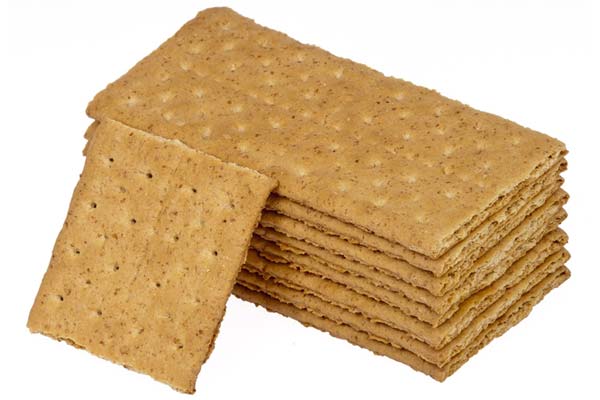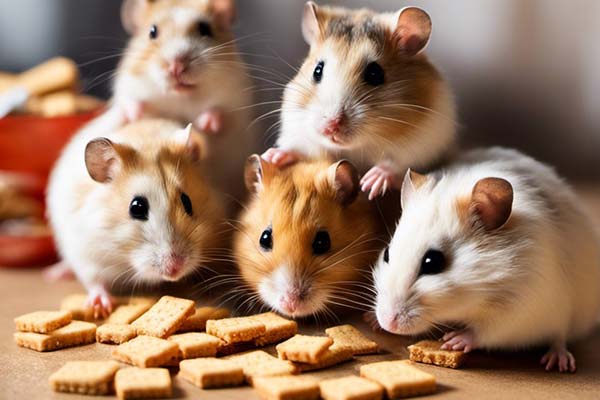Hamsters are popular pets that require a balanced diet to stay healthy. While they primarily feed on pellets, fresh fruits, and vegetables, pet owners often wonder if they can feed their furry friends other human foods. One such food is crackers. Can hamsters eat crackers? The answer is yes but with some precautions.
Hamsters can easily digest wheat-based crackers, but not all types are safe. Avoid salted or seasoned ones, and only give plain crackers occasionally in small pieces to prevent choking. Be cautious about portion sizes to avoid obesity and digestive problems due to hamsters’ small digestive systems.
Can Hamsters Eat Crackers?
Hamsters are omnivores and can consume a range of foods, including crackers. Yet, knowing the nutritional value and safe eating recommendations for crackers is vital to maintain your hamster’s well-being.
Yes, Hamsters Can Eat Crackers – Nutritional Content and Benefits
Hamsters can easily digest wheat crackers, rich in carbohydrates and fiber, promoting their health. Opting for plain crackers over salty options is crucial to prevent potential harm from excessive salt intake.
Guidelines for Safe Cracker Consumption
When feeding your hamster crackers, there are a few guidelines to follow to ensure their safety:
- Always supervise your hamster while they are eating to prevent any accidents from happening.
- Steer clear of crackers with excessive sugar or salt to protect your hamster’s well-being.
- Make sure to give them in moderation and adjust their diet accordingly.
- Moderation and Serving Size Recommendations
While crackers can serve as a nutritious hamster treat, offer them moderately to avoid weight gain and health problems. Limit your hamster to one or two weekly crackers, adjusting for their size and dietary requirements.
Risks and Precautions
While hamsters can eat crackers, there are some risks and precautions that owners should be aware of. Here are some potential concerns to consider:
Potential Digestion Issues
Excessive crackers can cause digestion problems in hamsters due to their low fiber content. Added sugars in some crackers are unnecessary and harmful to hamsters. Limit cracker portions and choose plain, unsweetened options to prevent these concerns.
High Sodium Content Concerns
Several cracker brands have excessive sodium, a concern for hamsters that need low-sodium diets. Excess sodium can cause dehydration and health problems. Hamster owners must review cracker nutrition labels and opt for low-sodium choices.
Avoiding Flavored Crackers
Flavored crackers with ingredients like garlic or onion powder can harm hamsters, leading to digestive problems and health issues. Hamster owners should opt for plain crackers instead of flavored ones.
Alternatives and Homemade Treats
While it is safe for hamsters to eat plain, unsalted crackers in moderation, other alternatives and homemade treats can provide more nutritional value and variety to their diet.
Recommended Commercially Available Hamster Treats
Various commercially available hamster treats are specifically formulated for hamsters and provide a balanced mix of nutrients. Some of the recommended hamster treats include:
- Kaytee Forti-Diet Pro Health Hamster Treats
- Oxbow Simple Rewards Baked Treats
- Vitakraft Drops with Yogurt for Hamsters
When selecting hamster treats, check the ingredients for harmful additives or preservatives.
Fruits and Vegetables Suitable for Hamsters
Adding fruits and vegetables to a hamster’s diet is nutritious and delicious. Safe options for hamsters include:
- Apples (without seeds)
- Carrots
- Cucumber
- Blueberries
- Broccoli
- Kale
Introducing new fruits and vegetables slowly and in small quantities is vital to avoid digestive issues.
Making Homemade Hamster-Friendly Crackers
Making homemade hamster-friendly crackers can be a fun and easy way to provide your hamster with a healthy and tasty treat. Some ingredients that can be used to make homemade hamster crackers include:
- Whole wheat flour
- Rolled oats
- Unsweetened applesauce
- Carrots
- Parsley
To create the crackers:
- Combine and roll out ingredients.
- Slice and bake until crispy.
- Keep homemade hamster crackers in a sealed container for a week.
Feeding Frequency and Quantity
When offering crackers to hamsters, remember they’re an occasional treat, not a regular meal. Feeding depends on factors like age, weight, and health.
Determining Appropriate Amounts of Crackers
Due to their tiny stomachs and limited digestive capacity, it’s best to treat hamsters with a few crackers. A guideline is to offer them a piece of cracker that’s one-third of an inch long per day.
It is also essential to remember that crackers can be high in sodium, artificial flavoring, and coloring, which can harm hamsters if consumed in large quantities. Therefore, ensuring that the crackers given to hamsters are plain and not seasoned or salted is crucial.
Establishing a Suitable Feeding Schedule
Feeding crackers to hamsters should be done on a limited basis. Generally, hamsters should not be given crackers more than once or twice weekly. It is important to note that crackers should not be used as a substitute for their regular diet, which should consist of a balanced mix of fresh vegetables, fruits, and grains.
Feed hamsters crackers during their active evening or nighttime hours for the best chance of them eating it. Offering crackers during the day might lead to them being ignored.
Cracker Types
When it comes to feeding hamsters crackers, it’s essential to consider the type of cracker offered. Here are some specific cracker types and what to keep in mind:
Can Hamsters Eat Saltine Crackers? – Considerations and Cautions
Saltine crackers are a popular type of cracker that many people enjoy snacking on. While hamsters can technically eat saltine crackers, it’s essential to be cautious about how much is given and how often.
Saltine crackers are rich in salt, posing a risk to hamsters in excessive consumption. Their high carbohydrate content can also cause weight gain and other health problems if included regularly in a hamster’s diet.
If you offer your hamster a saltine cracker as a treat, ensure it’s only a tiny piece and not a regular part of their diet. It’s also a good idea to opt for unsalted or low-salt saltine crackers to minimize the risk of harm.
Ritz Crackers and Hamsters – Benefits and Potential Risks
Ritz crackers are another popular type of cracker that many people enjoy snacking on. While hamsters can technically eat Ritz crackers, knowing the potential risks and benefits is essential.
Ritz crackers offer carbs and fiber for hamsters, but their fat and sugar content, if regularly consumed, could lead to weight gain and health problems.
If you offer your hamster a Ritz cracker as a treat, ensure it’s only a small piece and not a regular part of their diet. It’s also a good idea to opt for plain or low-fat varieties of Ritz crackers to minimize the risk of harm.

Digestive Health and Stomach Problems
Hamsters can experience stomach issues if fed inappropriate foods, including crackers. It’s important to moderate their cracker intake and be vigilant for digestive problems.
Signs of Stomach Issues
Some common signs of stomach problems in hamsters include diarrhea, constipation, bloating, and loss of appetite. If your hamster is experiencing any of these symptoms, it’s crucial to take action quickly to prevent the issue from worsening.
Steps to Help Hamsters with Digestive Problems
If your hamster is experiencing digestive problems, there are a few steps you can take to help them feel better. These include:
- Limiting their intake of crackers and other high-carbohydrate foods
- Supplying ample fresh water to aid in flushing their system.
- Adding more fiber to their diet through hay or fresh vegetables
- Offering probiotics to help restore healthy gut bacteria
If your hamster’s symptoms worsen, consult a vet for further guidance on improving your pet’s well-being and preventing future digestive problems.
FAQs about Hamsters and Crackers
Hamsters are known for their love of nibbling on various foods, including crackers. However, pet owners should always be cautious about what they feed their furry friends.
Can Dwarf Hamsters Eat Crackers?
Yes, dwarf hamsters can eat crackers in moderation. However, pet owners should opt for plain, unsalted crackers devoid of added flavors or seasonings. Note that dwarf hamsters face a higher diabetes risk; thus, crackers should be an occasional treat.
Can Hamsters Eat Flavored Crackers?
It is not recommended to feed hamsters flavored crackers. Many flavored crackers have unhealthy ingredients like sugars, artificial flavors, and excessive salt that can harm hamsters, especially those needing a low-sodium diet.
How Do Crackers Affect Hamster Dental Health?
While crackers can assist in maintaining a hamster’s teeth, they shouldn’t be the sole dental care food. Hamsters need a fiber-rich diet for digestion and dental health. Regularly feeding them crackers can cause dental and overall health problems.
Conclusion
In conclusion, hamsters can eat crackers in moderation, but pet owners should be careful about how much they feed their furry friends. Plain, unsalted crackers are the best option for hamsters, and flavored crackers should be avoided. Crackers should only be given as an occasional treat and should not be a regular part of a hamster’s diet.

